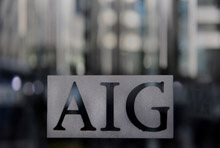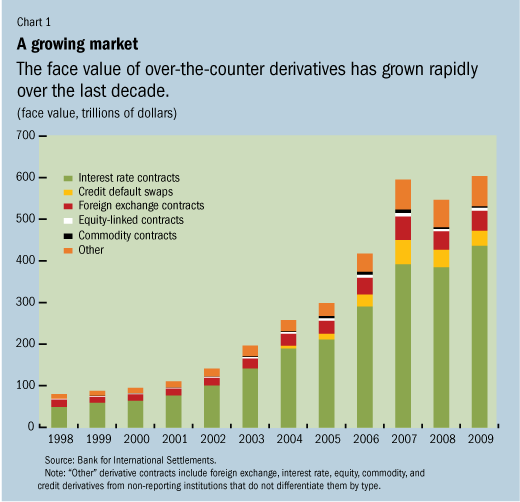
Typical street scene in Santa Ana, El Salvador. (Photo: iStock)
IMF Survey: Centralized Derivatives Clearing Would Aid Financial System
April 13, 2010
- Over-the-counter derivatives trading has surged, creating systemic risks
- Replacing two-party trading with central counterparties would reduce risk
- Close coordination of cross-border regulatory frameworks is essential
Derivatives traded over the counter––that is, between two parties bilaterally rather than on an organized exchange––have proliferated in recent years and present a systemic risk to the financial system should the failure of one party or the other to live up to its payment obligations trigger a cascading wave of such failures.

Insurance company AIG was bailed out after its derivatives business collapsed as global financial crisis deepened in 2008 (photo: Stan Honda/AFP).
GLOBAL FINANCIAL STABILITY REPORT
The IMF says that risk, called counterparty risk, could be substantially minimized if bilateral contracts were cleared through a central counterparty (CCP) mechanism, which essentially acts as a counterparty to all counterparties. Most members of the CCP would be banks and dealers, but some CCPs could allow other financial market participants to become clearing members.
Outstanding over-the-counter (OTC) derivatives contracts have grown rapidly over the last decade, from a total notional, or face, value of less than $100 trillion in 1998 to more than $600 trillion in late 2009—although that figure overstates the risks associated with this market—the IMF said in a study that is part of its semiannual Global Financial Stability Report. According to the IMF, total contracts (see Chart 1) include many redundant, overlapping deals because counterparties in bilateral situations usually write an offsetting contract, rather than closing out the original one.

Bilateral trades exacerbate counterparty risk, and add to the complexity and opacity of the interconnections in the financial system, the IMF said. That became apparent in September 2008, when authorities had to make expensive decisions regarding the Wall Street investment bank Lehman Brothers and insurance giant AIG based on only partially informed views of potential cascading effects of the firms’ failures.
Central clearing can reduce counterparty risk
The IMF report shows how CCPs could reduce counterparty and systemic risk through the enforcement of robust risk management standards, the sharing of losses of members of CCPs, and multilateral netting, in which obligations are settled not on a counterparty-by-counterparty basis but by netting out all contracts among all the counterparties in the CCP. For example, multilateral netting could reduce outstanding notional amounts of credit default swaps by about 90 percent. The CCP would have resources to handle any failures—mainly from the CCP’s members, which would be expected to post collateral and contribute to a guarantee fund.
In a simple four-counterparty network, for example, a CCP can reduce the complexity of the interconnections by interposing itself as counterparty to every transaction. In that example, counterparty A may be exposed to the failure of counterparties B, C, and D in a world in which all contracts are settled bilaterally—that is between the parties themselves (See Chart 2, left-hand panel).

Even if A has no contracts with say, B, if B has a contract with C or D and A has one with C or D, then the failure of B could still affect the ability of C or D to fulfill its contract with A. But when a CCP takes all sides in transactions, A’s exposure is only to the central clearinghouse, which nets out all the individual exposure (See Chart 2, right-hand panel). Not only are counterparty risks reduced (although not eliminated because the CCP has risks), so are their operational risks because clearing is done with one counterparty rather than with many.
However, the IMF report warns that because counterparty risks are now concentrated in each CCP itself, the central mechanisms must be subject to high risk management standards, and be effectively regulated and supervised. Moreover, the IMF said that, given the global nature of OTC derivatives markets, close cross-border coordination of regulatory and supervisory frameworks is required. This would also help avoid regulatory arbitrage and adverse spillovers across countries. Ideally, the CCPs themselves would develop linkages that allow for more netting and lower collateral needs, but so far, legal and other obstacles have made this difficult.
Because of the concentration of credit and operational risk in a CCP, the IMF also emphasized the need for authorities to have in place contingency plans and appropriate powers to deal with a CCP failure on a globally coordinated basis. At the national level, the IMF recommends that central banks should also be positioned to provide emergency backup liquidity to systemically important CCPs.
Enticing dealers and end users
The IMF report also points out that the benefits of systemic risk reduction can be achieved only if enough contracts are moved to CCPs. In that regard, there remain some issues, including potentially large up-front costs to dealers. According to the report, upfront dealer costs, in terms of collateral posting and contributions to CCP guarantee funds, could be as much as $150 billion.
If dealers require extra incentives to move bilateral contracts to CCPs, the IMF report suggests they could be charged a fee tied to the risks that their derivative positions impose on other counterparties. However, if incentives do not work, it may be necessary to mandate movement of contract to CCPs to overcome the reluctance some may have with being first movers, the IMF said. If a mandate is necessary, it should be phased in gradually as the economic recovery may suffer if dealers and other financial institutions need to post large amounts of collateral.
In any case, the IMF said that all OTC derivative transactions, should be recorded and stored in regulated and supervised trade repositories, and detailed individual counterparty data should be available to all relevant regulators and supervisors.


